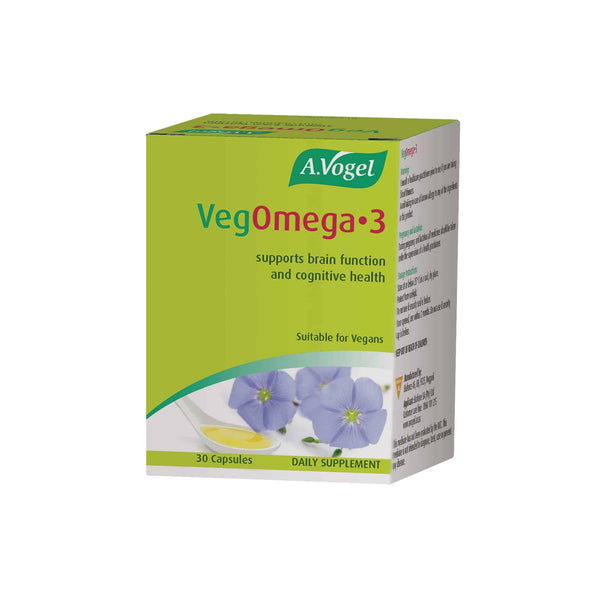-{[{ ((ps.selectedVariant.compare_at_price - ps.selectedVariant.price) / ps.selectedVariant.compare_at_price * 100 ) | number:0 }]}
%


A.VOGEL VEG OMEGA-3 CAPS
R 299.95
Unavailable
- A.Vogel Veg Omega-3 Caps provide a purely plant-based source of essential omega-3 fatty acids, crucial for maintaining cardiovascular, neurological, and immune system health.
- These fatty acids are integral components of cell membranes, ensuring they remain flexible and functional, which supports normal cellular metabolism.
- By supplementing with Veg Omega-3, you help your body maintain optimal cell function and overall well-being.
- This expert-formulated supplement is ideal for those seeking a vegan-friendly option to support heart health, brain function, and immune resilience through essential fatty acids derived from plants.
Each VegOmega-3 capsule contains:
Active ingredients:
- Flaxseed Oil (Linum usitatissimum, seed) 400 mg, - providing 200 mg of alpha-linolenic acid (ALA);
- Schizochytrium algae 214 mg, - providing 75 mg of docosahexaenoic acid (DHA).
Other ingredients: Eucheuma seaweed, glycerol, monoglycerides of fatty acids, peppermint oil, potato starch, RRR-alpha-tocopherol, sorbitol,
Contains sugar: Sorbitol 86,00 mg. Not derived from fish or other animal sources
Directions:
Adults and adolescents 12 years and older:
- Maintenance of good health: 1 – 2 capsules daily
- To support brain and eye function: 3 - 4 capsules daily
- Maintenance of normal blood cholesterol and blood triglyceride levels: 3 - 4 capsules daily
Children and adolescents 5 – 11 years:
- Maintenance of good health: 1 capsule daily
- To support brain and eye function: 2 capsules daily
Children 2 – 4 years:
- 1 capsule daily Take capsules with water or squeeze the contents over food.
Supplement facts:
- Its estimated that many of us have 20 times the amount of omega-6 in our systems as omega-3, yet it is believed that a ratio of 3:1 Omega- 6 to Omega-3 is the ideal for our heart health.
- Omega-6 fatty acids are also polyunsaturated fatty acids that are also essential fatty acids , meaning that we can’t make them and have to obtain them from food.
- Plants store most of the Omega 6 fat in their seeds as linoleic acid, which they convert to alpha linolenic acid (ALA) upon germination. BUT because the use of seed oils has increased in Western countries and our livestock are fed on grains instead of grasses, linoleic acid has become much more prevalent in our diets than ALA since the seeds are not getting to germination stage.
- Also many food manufacturers remove Omega-3's from foods during processing in order to increase shelf life and product stability.
- Omega-6 fatty acids help lower LDL cholesterol (the ‘bad’ cholesterol), are protective against heart disease and also necessary for healthy skin. However a key difference is that Omega-6 acids are pro-inflammatory whereas Omega-3 fatty acids are anti inflammatory.
- The problem is that these two fats compete to get into the cells of our bodies. If we have too much pro-inflammatory Omega-6's, the anti-inflammatory Omega-3’s can’t do the work that they need to do to fight the inflammation that more and more health professionals are recognising as a root cause of many chronic diseases.
- The amounts and balance of these fats in a person's diet may affect the body's eicosanoid-controlled functions, with effects on cardiovascular disease, triglycerides, blood pressure and arthritis. To counteract the increased inflammation in the body many people have to take aspirin and other NSAIDS (non-steroidal anti-inflammatory drugs) when simply correcting our Omega 3 to Omega 6 dietary intake could be the solution.

